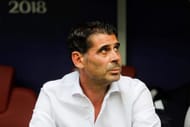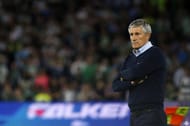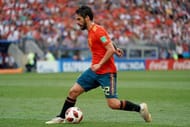After the latest shock result of what has been an absolutely majestic World Cup tournament, some of the game’s leading nations will have to answer some very tough questions.
Before the tournament started, Spain would have been one of the names being hotly tipped for the trophy following Julen Lopetegui’s stellar rebuilding efforts following the shameful performances of the team under Vicente Del Bosque at the 2014 World Cup in Brazil and the 2016 European Championships in France.
Following the resignation of some top members of the Golden Generation like Xavi, Xabi Alonso, Iker Casillas amongst others, Lopetegui turned to the younger generation which had been largely overlooked by the very lazy Del Bosque. The result was a La Furia Roja team that looked exciting, dynamic and adventurous while retaining the qualities that made the Golden Generation stand out: quick passing, intelligent use of the ball among other.
The Loptegui sack and its ripple effects

However, all that good work was thrown away following Florentino Perez’s decision to hire Lopetegui as the new manager for European champions Real Madrid without the knowledge or authorization of the Spanish Football Federation (RFEF).
RFEF president Luis Rubiales in a bid to establish himself as being his own man and being mindful of the very unique beast that is Spanish football (with its fascinating mix with tribal/regional politics) made the decision to dispense with Lopetegui two days before the World Cup started.
Fernando Hierro was appointed in his place and while the 3-3 draw with Portugal in the opening game looked an acceptable result, it papered over the cracks that had not been visible during Lopetegui’s time.
Throughout the 4 games they played, Spain looked dull, witless and a far cry from the exciting team that had ripped through World Cup qualification with ease. Instead, the team bore a shameful resemblance to the tired and slow-witted side that was disgraced in Brazil 4 years ago.
Despite the quality available to him and with the errors glaringly staring everybody in the face, Hierro showed his limited tactical nous by failing to change the team’s set-up.
David de Gea, David Silva, Andres Iniesta and Gerard Pique had been very poor before the quarterfinal clash against Russia, yet Hierro persisted in playing all these players (Iniesta was subbed in) and Spain deservedly lost out to a limited Sbornaya (The Team) side which had a game plan and stuck to it.
While Lopetegui had chosen to go with a gradual evolution rather than revolution after the disastrous campaign at Euro 2016, Spain must make big changes if the team is to get back to the level it was in 2008.
The first change would have to be to get in a manager who is smart enough to tinker and adjust the traditional tiki-taka style of play to something more modern (something similar to what Pep Guardiola did at Manchester City last season). The era of death-by-a-thousand-passes needs to be left behind and a faster, more direct style adapted to fit the systems which the younger players are already used to, having been playing variations of this style at club level.
The changes needed for Spain to get back to its best

While the cupboard for a new coach for La Furia Roja is not exactly brimming with top quality (Guardiola, Roberto Martinez, Marcellino Toral are engaged/will not be willing to take over), coaches who play this more modern version of the late Luis Aragones’ tiki-taka style are available, some examples are Real Betis’ attack-first maverick Quique Setien and Sevilla’s impressive young coach Pablo Machin.
Players like Iniesta, Silva, Pique and Pepe Reina should be eased out of the team as they have been brilliant in the past but are not what Spain will require going forward.
While Lopetegui did well in ridding Spain of the big-club bias (i.e. Real Madrid and Barcelona) that the shamefully lazy Del Bosque propagated during his time, the new manager will need to do more and give a sense of belonging to players playing outside the El Clasico giants (a player like Inaki Williams was shamefully excluded while a plodder like Lucas Vasquez made the World Cup team).
Spain's Generation Next
Good enough, Spain has quality youngsters in almost all positions and the new manager will have some of the world’s finest young talent to work with. The dazzling Euro U-21 set of 2013 are in their mid-20s now and should be the core of the team (Isco, Koke, Asier Illaramendi, Dani Carvajal, Thiago Alcantara, Rodrigo Moreno and others).
In goal, de Gea is not San Iker 2.0 and should not be assured of the numero uno shirt as he is yet to earn that privilege: others like Kepa Arrizabalaga (Athletic Bilbao) or Sergio Rico (Sevilla) need to be given chances to show what they can do.
Spain is not going to have a shortage of quality fullbacks anytime soon. There is no need for the likes of Nacho Monreal and Nacho Fernandez to occupy the slots any longer given the quality possessed by the likes of likes of Jose Gaya and Toni Lato (Valencia), Aaron Martin (Espanyol), Alvaro Odriozola (Real Sociedad), Hector Bellerin (Arsenal) amongst so many others.

Jorge Mere (Koln), Jorge Saenz (Tenerife), Diego Llorente (Real Sociedad), Yeray Alvarez are younger players that can provide quality competition for the Sergio Ramos-Pique central defensive pairing.
Midfield is chock-full of quality with Atletico Madrid new boy Rodri, Valencia’s Carlos Soler, Real Madrid’s Dani Ceballos and Villareal's Pablo Fornals chief among the young guns that look ready to make the step-up.
Diego Costa was Spain’s best player in Russia and will play a key role for whoever takes over from Hierro. Alvaro Morata should have shaken off his first season troubles and Chelsea and would be a tasty option to have while it is hopeful that Paco Alcacer can leave Barcelona and get his form back to what it was during his Valencia days.
With the likes of Marco Asensio (Real Madrid), Williams and Iker Muniain (Athletic Bilbao), Mikel Oyarzabal (Real Sociedad), and Santi Mina (Valencia) amongst the many dynamic Spanish wingmen available, the new manager will have a lot of quality to work with.
Unlike its former colony Argentina, Spain has the quality needed to bounce back from the disappointing experiences of the last three tournaments.
Luis Rubiales and his RFEF cohorts will have a difficult task getting the right man to manage this revolution but if they can get lucky and get in a manager who would be willing to make the big changes needed (like Aragones did in 2008), there is no reason why Spain should not be back at the top of world football come Qatar 2022.
